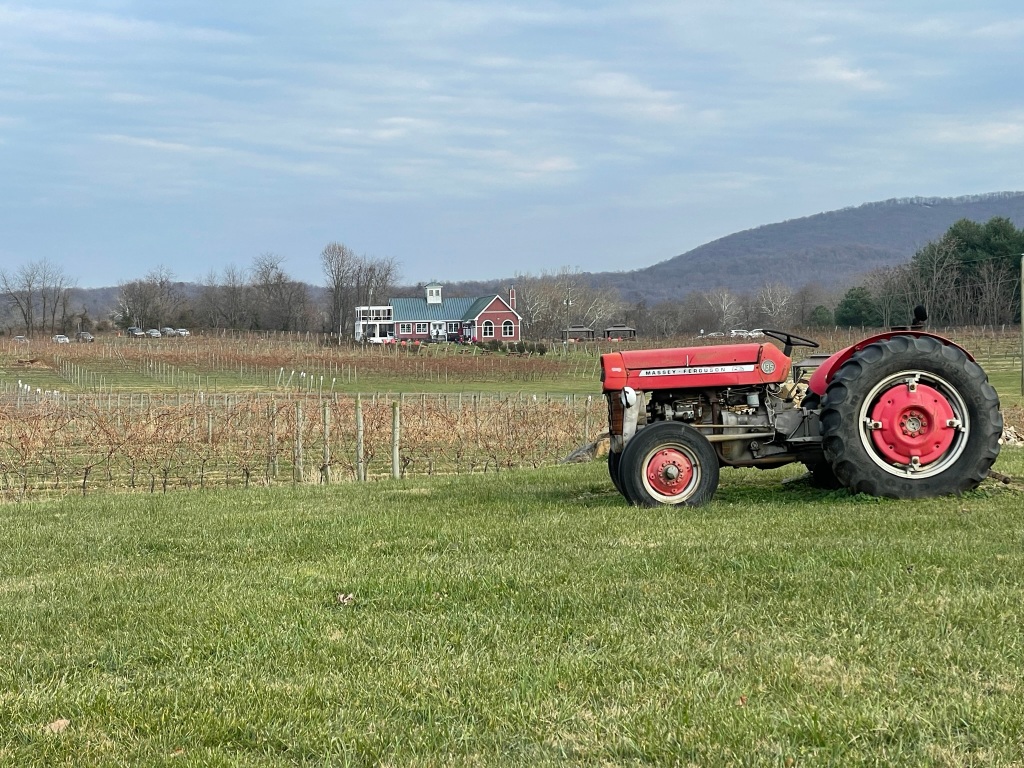This was far from my first visit to Philip Carter Winery (PCW) or even my first blog here. But I happened to run into owner Philip Carter Strother at PCW’s sister winery of Valley View Farm and he insisted I make a new trip, so an update was in order.
A discussion of wine isn’t supposed to be preceded with a history lesson, but in the case of PCW I can’t help myself. It helps that Philip loves to discuss his family history. And you can’t blame him – you would too if you were able to trace your family’s lineage to America’s first winemaker.


While Thomas Jefferson is America’s most famous wine connoisseur, the truth is he failed when it came to growing wine. Few realize that almost 20 years earlier the Carter family succeeded where even Jefferson failed.
The Carters were among the Virginia colony’s most influential landowners. In 1762 Charles Carter sent a dozen bottles of wine made from vines at his plantation of Cleve (located in today’s King George County) to London’s Royal Society of Arts. Impressed with what they sampled, the Society awarded him a gold medal for his “spirited attempt towards the accomplishment of their views, respecting wine in America.”

But getting back to PCW, a few things had changed over the past several years. For one, Valley View’s vineyard is now in full production, which gives PCW access to high-quality fruit. Another change was their new winemaker, Tony McDonnell. Lastly, PCW’s tasting room went through a major upgrade. Philip brought me up to speed on all these.

Valley View is owned by PCW but operates as a separate winery (although all winemaking is done at PCW). It’s only 10 miles north but the site is much better situated for wine growing, with higher elevation and excellent soil. 5 acres of vinifera vines are planted there, with more on the way.
The importance of a really good vineyard site can hardly be overstated, especially given the extreme weather variations that’s becoming apparent in Virginia. Smart vintners are adjusting by either replanting with hardier grape varietals or finding better vineyard locations. Philip is doing both. PCW’s estate “Ten Vines” vineyard will likely see more hybrids in the future, while Valley View is poised to become their prime source of vinifera.
Philip also talked extensively about his new winemaker, Tony McDonnell. Tony previously worked at a large commercial winery in Pennsylvania but was looking for something more artisanal. Philip wisely offered him a job here. While only the newest wines in PCW’s lineup had his touch, everything he had a hand in I was impressed with.
Lastly, PCW has gone all-in on upgrading their indoor and outdoor spaces. We chatted at a new upstairs club area. Their outdoor space was recently completed. While COVID is almost certainly the main rationale behind this new patio, it’s an upgrade that I’d welcome in any case.


I had the full lineup of PCW wines, with a cider thrown into the mix. Occasionally Valley View Farm and PCW may share a wine, but for the most part they are kept separate.
If I had to pick a favorite it would have been the 2019 Cleve, which was young but outstanding. The Viognier and cider were worthy runners up, and the Chambourcin/Norton blend was shockingly good – and I say that as someone who rarely loves either grape.


For whites and lighter wines:
- 2020 Chardonnay: Fermented half in steel & half in oak, this would appeal to those who love both styles.
- 2020 Viognier: Floral, honeysuckle nose with a nice smoothness to it. I’ve been on a Viognier kick lately and thought this was exceptional, so I brought a bottle to go.
- Noble Pome: A dry cider infused with honey. While Valley View is their main cider location, occasionally you can find ciders here as well. I often find modern ciders too overwhelming but this was much more wine-like in style.
- 2020 Roswell Rosé: Chambourcin, smelled like strawberries. Fruit notes but dry.
For reds & dessert wines.
- 2020 Cabernet Franc: Little bit of spice with some fruit notes.
- 10 Vines Cabernet Sauvignon: “10 Vines” is a label used by PCW for more experimental wines, namely from out of state. This was a California Cab Sauvignon which I certainly enjoyed, even if it was a stark difference to what I’m used to elsewhere in the state.
- 10 Vines Merlot: Ripe is the key adjective here. I’m used to California Cabs so a Merlot was a nice change of pace and I really enjoyed it.
- 2019 Cleve: 50/50 Petit Verdot and Tannat. Not as young as I would have thought; well integrated oak, nice balanced overall.
- 2020 Chambourcin/Norton blend: Norton dominates the notes but it doesn’t have the ‘foxy’ characteristic I’m used to. Fermented in steel then neutral oak.
- Sweet Danielle: Late harvest Petit Manseng.
- 2015 vintage “1762”: Port-style with Chambourcin.
I’m really looking forward to seeing Tony’s upcoming wines (and ciders – he makes those too). Have you been to PCW lately? What do you think of the changes?
